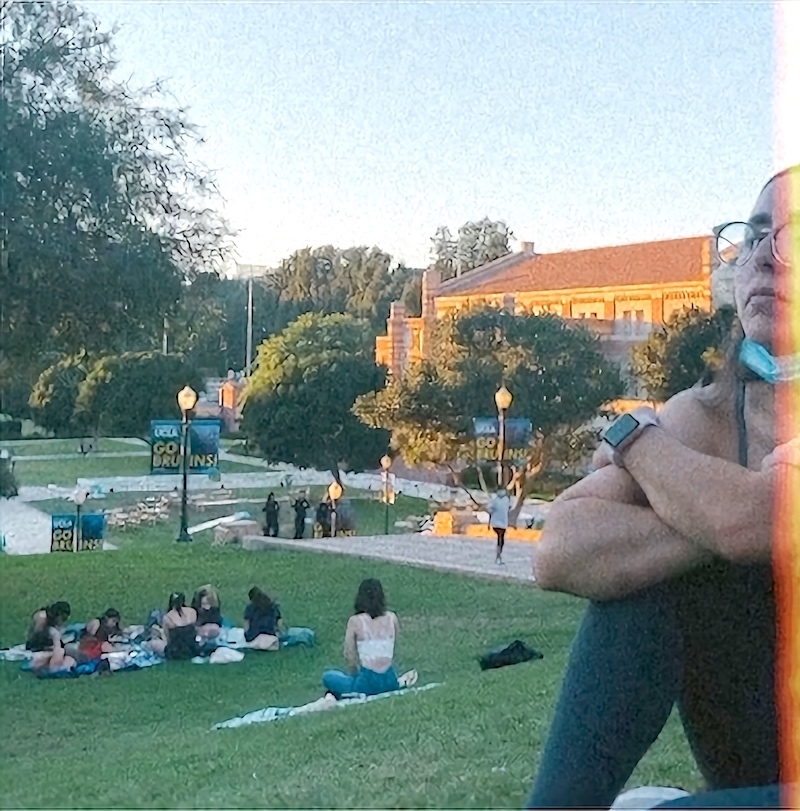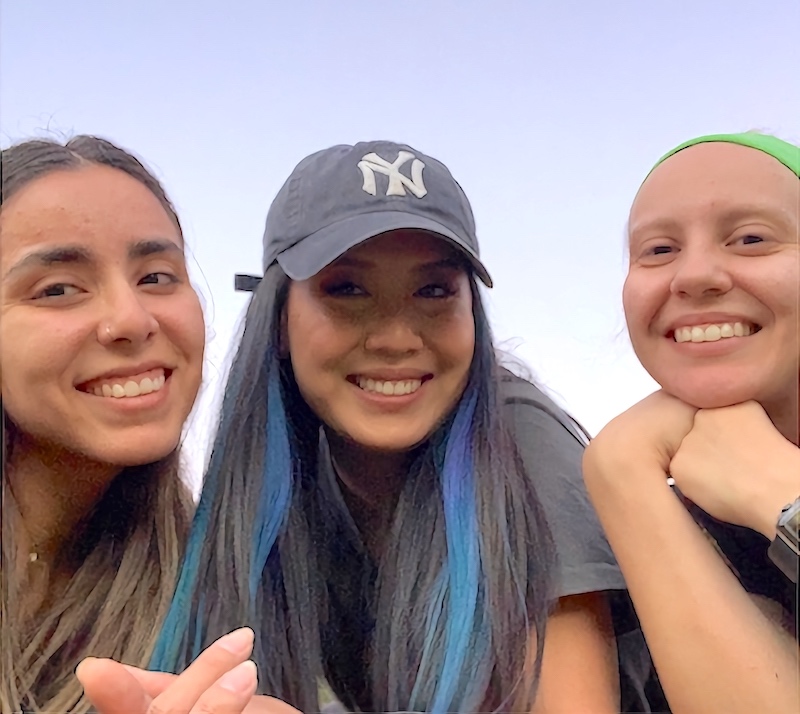Student Blog
Classes
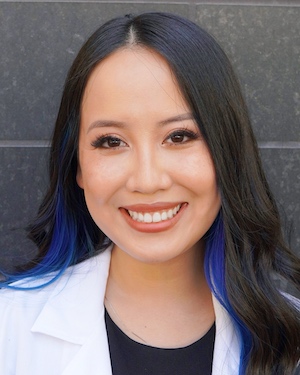
Fight, Fight, Fight On! ⟩
November 19, 2021, by Teresa
Admissions Classes Diversity Living in LA
Tomorrow is the big game and with it comes the long-standing question of Los Angeles: “USC or UCLA?” Forget sideline reporters, say goodbye to sports commentators, play-by-play who? I believe I am the most qualified individual to provide an answer for these reasons:
- I went to UCLA
- I go to USC
- Refer back to reasons 1 and 2
All jokes aside, when I committed to USC for graduate school, I had some concerns about how I would transition from the nation’s #1 public university into the #1 occupational therapy program. Without further ado, here is one Brojan (Bruin turned Trojan, or vice versa)’s totally impartial, and absolutely not at all biased, take on my experiences at both schools.
Quarter System vs. Semester System
At UCLA, we followed a quarter system, meaning each term was 10 weeks long, three terms each academic year. Because of how fast-paced this was, I thought a semester system would be an easy adjustment but sometimes, it still feels like my mind functions on 10 weeks’ time. Kind of like when you return from traveling somewhere really far and have to readjust to the time difference. Yeah — just like that, but for a much longer period of time. For example, I am currently entering week 14 out of 16 and my mind is saying to the semester, “You’re done. You’re done. You should be three weeks into the next term already.” Because 16 weeks and NOT 10? The math is just not mathing for me. What does make sense for me, however, is how nice it feels to have time to sit with content, follow up about anything I need clarification on, and really feel like I’m learning and not just regurgitating. And it doesn’t hurt that with the longer terms come longer breaks!
Public University vs. Private University
Growing up, the words “private school” sounded so elite and since public school was all I had known, attending a public university like UCLA after high school felt like the natural progression, so I didn’t even bother applying to USC.
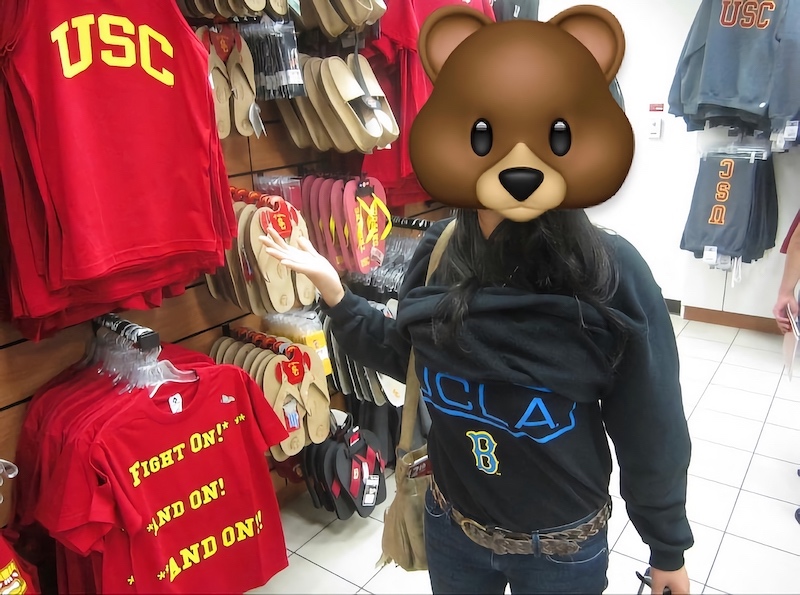
Sophomore me visiting the USC Bookstore on a high school field trip in May 2012. The irony is not lost on me that I now have the sweater in the background, which I am currently wearing while writing this.
When applying to OT school, a part of me still held the notion that private = elite and public = diversity, but that myth was quickly dispelled when I met my classmates, who are each so different and unique in their backgrounds, life perspectives, age, appearance, and interests, thanks to the holistic admissions process implemented at USC Chan. The insights shared by my classmates both in and out of the classroom have been quintessential to facilitate my learning as I continue to develop my clinical identity. I feel an immense sense of pride knowing that my classmates will be entering practice as some of the most culturally responsive clinicians this field has to offer and that their clients and future generations will be able to see themselves in their providers.
My family always emphasized that education is an investment to give myself the best chance at life, so when deciding which program to attend, what better is there than the best? I could think of no better place to invest in myself than at USC Chan, which, in case you forgot, is the #1 occupational therapy program in the nation, and it shows. It’s pretty surreal to walk the halls of the Center for Health Professions (CHP) and know that it’s the birthplace of sensory integration, occupational science, Lifestyle Redesign, and so much more. Occupational therapy students all over the world are learning through textbooks written by the same professors you get to see face-to-face everyday. Since starting this program, it’s been clear that our faculty, staff, ambassadors, student leaders, and alumni are committed to fostering a space where the next generation of occupational therapists can both advocate for our profession while challenging it to change to meet client needs.
Undergraduate Degree vs. Graduate Degree
The pursuit of my undergraduate degree was filled with twists and turns regarding what career I wanted that degree to lead to — pediatrician, lawyer, software engineer, teacher, and at one point, even paleontologist! I am always amazed (and slightly jealous) when I hear Bachelor’s to Master’s students share why they chose to pursue OT when they were a senior in high school, because I didn’t know about OT until I was 20. While I don’t regret my journey because it’s what led me here today, I will say school was so much harder when I didn’t know what I was meant to do. It was also so much harder when I couldn’t imagine myself ever using organic chemistry or multivariable calculus in my career, yet still had to take those classes in order to get my degree. To this day, the fact that I know how to draw molecular structures using benzene rings or chair conformations has not served me. Not once!
Entering graduate school provided an opportunity for a clean slate. I was able to start over as a student at a new school but this time, as a student with a strong understanding of what I wanted while taking courses focused on what I was interested in. By acknowledging that all of the content I learn in the classroom could be applied to practice, being a student has become a more engaging and meaningful experience.
So, USC or UCLA?
This question is hard to answer because ultimately, I am so thankful to both. My experiences at UCLA led me here to USC, where I find myself growing professionally and personally everyday. Both allowed me to be close to home and near my family, who I wouldn’t be here without. At one, I was able to identify my weaknesses and at the other, take a strengths-based approach. This past weekend, I showed my friends Silvia and Vanessa around UCLA, where we sat next to Janss Steps and talked for hours.
While walking the same paths I used to take to class, I remembered how I felt there when the thought of becoming an occupational therapist seemed like a distant, unattainable dream because I couldn’t see past who I was on paper — just another GPA, GRE score, and 1000 words. And becoming a USC Chan occupational therapist? Dream on.
Look at you now. Fight, fight, fight on. 💙 🐻 💛 ✌️ ❤️
⋯
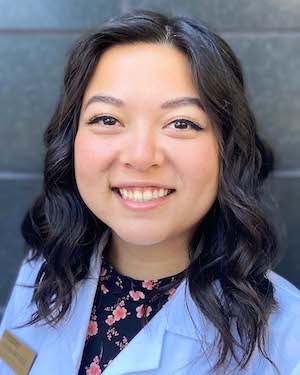
OT Dance Party ⟩
November 17, 2021, by Alyssa
Classes Getting Involved
I’ve been teaching Zumba at the USC Village Gym since Fall 2018. As an extrovert who struggles to prioritize exercising, it has been a win-win. I am obligated to get myself to the gym and energized from both the exercise and the social time. Especially with how challenging graduate classes can be, it is a much needed reset to my week every Tuesday.
So, what does this have to do with OT?
This week in OT 534 Health Promotion & Wellness we had a “wellness workshop” day where students got to facilitate and attend different occupation-based activity groups to promote personal wellness. When we got the sign-ups to facilitate a group, I signed up right away. Bringing Zumba to OT school!
My fellow students submitted their preferences and were assigned to different workshops to attend during class time (some of the other options were cookie baking, songwriting, and vision boarding 😮).
Given that dancing in classrooms filled with tables and chairs would not be ideal, we had to improvise for the space. We were out facing the elements on the lawn (muddy uneven grass, an unexpectedly hot November day) with a small speaker and a lot of funny looks from people walking by. But still, I had a blast, and based on all the laughing at/with me & each other, I think the participants did too. It was such a fun chance to share one of my favorite occupations with my friends, especially those who have never done it before. Dr. Cox stopped by during the workshop and thought I was putting up a “fight on ✌️” while dancing . . . truthfully I was just indicating that the move should be done twice, but hey — two birds one stone.
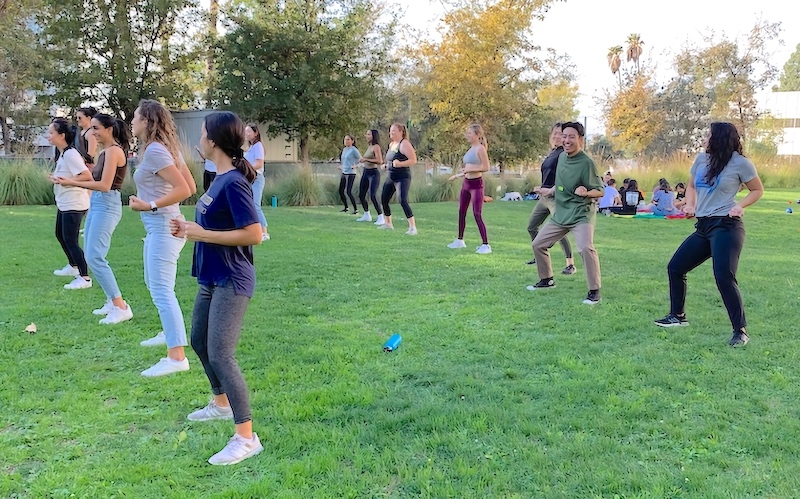
2nd year Entry-Level MA students participating in the Zumba workshop. Photo by Silvia Hernandez Cuellar
Even though I did not get to participate in the other activities, I loved how Wellness Workshop day highlighted how seemingly random skills could be an asset for OT’s role in health promotion. What other career path has a place for backgrounds in dance and martial arts and songwriting and cooking and crafting? I mean, OTD Resident John J. Lee even facilitated a Squid Games competition. Opportunities for wellness are everywhere — you never know what skills your colleagues will bring to the table!
⋯

A Love Letter to the OS Minor ⟩
October 27, 2021, by Alyssa
Classes What are OS/OT?
With USC course registration coming up, let’s chat about the occupational science (OS) minor and why it’s the best dang minor ever (Let’s be real — it’s part of my job to promote our programs . . . but I promise this is my honest opinion and I’d say all of this for free).
Undergrad was a very stressful time for me. My major courses involved many overlapping creatively-demanding projects, and I spent plenty of late nights glued to my computer to keep up with it all. For me, and for many others, the OS minor was a refuge. Beyond their obvious application to OT school and life in general, I thought they were all really fun and often were a stress-free few hours of my week. AND I actually remember what I learned in them. Here’s what I took & my favorite project from each class:
OT 250 (4 units): Introduction to Occupational Science and Occupational Therapy
- What is it? The only class required for the minor. It was like a sampler of everything OT has to offer — we learned about healthy habits and routines, flow, motivational interviewing, lifestyle redesign, OS research, neuroscience, stress management, sleep hygiene, creativity, exercise, sensory systems, and (still somehow) more!
- My favorite project: We wrote a paper to reflect on occupations that bring us into a flow state — I wrote mine about Zumba. 💃
OT 251 (4 units): Across the Lifespan: Occupations, Health and Disability*
- What is it? The OT department’s lifespan development class. This class was great preparation for the Team-Based Learning format used in several of the OT graduate classes. *(Bonus: it covers a prerequisite for the graduate program so it’s like a 2-for-1 deal.)
- My favorite project: Individually, our final assignment was to read a memoir by a person with a disability and relate it to the course — I applied the person-environment-occupation model to Tara Westover’s Educated and it was the first time I got to practice this kind of analysis.
OT 330 (4 units): Perspectives on the Daily Life of Families
- What is it? A class dedicated to the roles within and occupational impact of family life.
- My favorite project: A family tree diagram to identify occupational connections within our families. We could make it as extensive as we wanted, and I had a blast. My final tree was 23 pages wide 😮
OT 350 (4 units): Disability, Occupation, and the Health Care System
- What is it? Amazing guest speakers and meaningful discussions surrounding the varied experiences of living with a disability and navigating the health care system.
- My favorite project: We had weekly journals to reflect on our developing understanding of disability — my favorite journal activity was an accessibility scavenger hunt around USC’s main campus.
OT 370 (4 units): Understanding Autism: Participation Across the Lifespan
- What is it? This class was so different from psychology classes I had taken that included content about ASD. We focused on neurodiversity, lived experiences, and advocacy.
- My favorite project: My ‘media representation of ASD’ group project. I got to illustrate a children’s book and explore ways to help typically developing children understand their peers with ASD.
If I could have fit more in my schedule, I would have. Specifically, the human-animal interaction class. A few weeks ago, my friend’s dog was a guest speaker in that class — he was excellent.
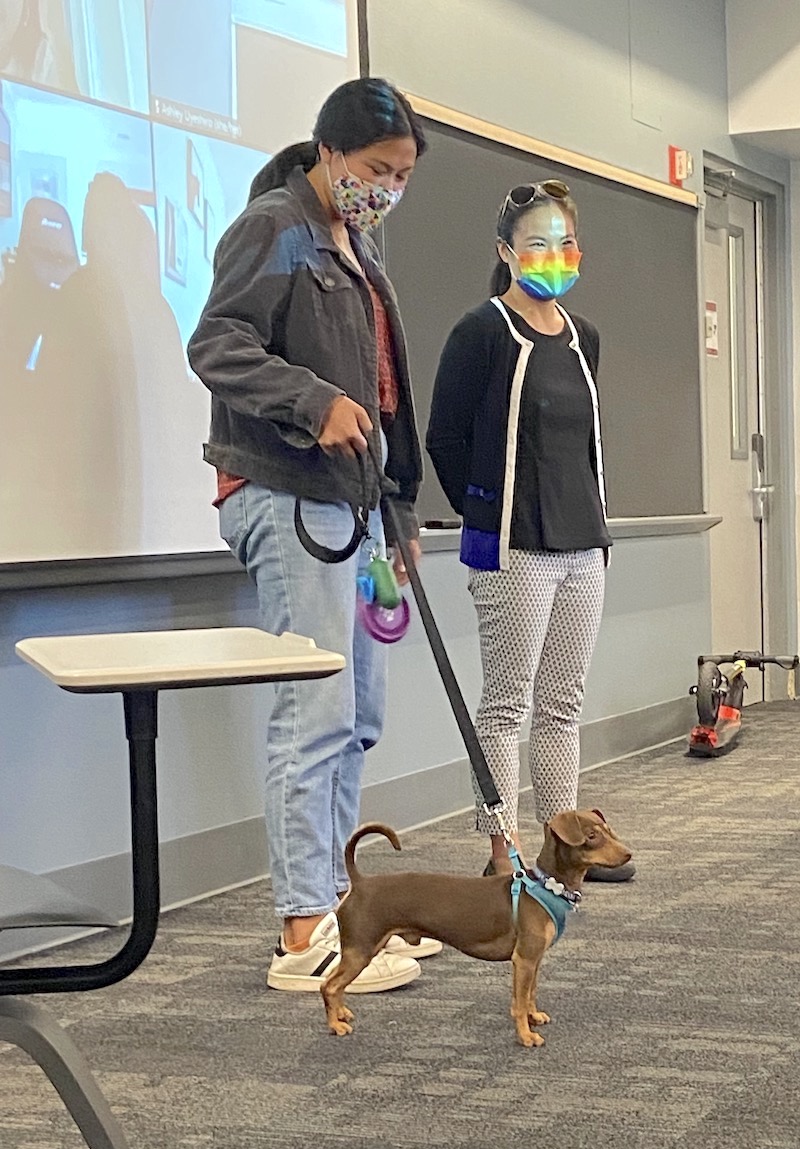
Dr. Ashley Uyeshiro Simon and guest speakers Samantha Kosai (human) and Oliver Kosai (small dog). The start of Ollie’s long career in academia, I’m sure.
As a student ambassador, I recently got to go back and give brief presentations to some of this semester’s OS minor courses, and it made me really nostalgic. When I feel nostalgic, I get emotional. When I get emotional, I write letters and never send them (usually because they are addressed to real people. Since this one is addressed to a non-sentient academic program, I’m ok with publishing it on the internet. So, here we go).
To my beloved OS minor,
I wish we could have spent more time together. I miss a lot about being an undergrad at USC, and your classes are no exception.
Thank you for classes that brightened my afternoons when I’d usually be needing a nap. Thank you for faculty mentors who have supported me through ups and downs both academically and personally (shout-outs to Linsey, Kate, & Kristy). Thank you for literally assigning some of my closest friends, Leah and Dakotah, to me as part of my group for OT 251 — they’ve stuck with me all the way til the MA-II program, and now they’re stuck with me for life.
Thank you for guiding me into the best career in the world.
✌️
Alyssa
⋯

The Giving T(e)ree(sa) ⟩
October 25, 2021, by Teresa
Classes Life Hacks What are OS/OT?
Heyyy, besties! So the moment we enter Q4 on October 1, I start thinking about giving season because not to brag, buuut . . . I take a lot of pride in that (I believe) I give fantastic gifts. Whether big or small, I always try to make sure my gifts show people I was really listening to them when they shared with me that they’ve been wanting “X” or are really into “Y.” My top love languages are “quality time” and “physical touch” so you can imagine how much ya’ girl struggled throughout the pandemic, I’m not going to lie. But “gifts” became a welcome . . . well, gift.
In OT 405: “Foundations of Occupation” last summer with Dr. Halle, we learned that occupational therapy is rooted in the Arts and Crafts Movement but that our OT-founding queen pointed out that “handiwork alone was insufficient” (Slagle, 1930, p. 271). Then in the 1961 Eleanor Clarke Slagle Lecture, Dr. Mary Reilly shared the famous quote, “[Wo]Man through the use of [her] hands as they are energized by mind and will, can influence the state of [her] own health” (Reilly, 1963, p. 2). I know, I know — what is this, another lecture? But these things really stuck with me because it gave a definition to the calmness and serenity I had felt my entire life when crafting.
Over the past year, one of my favorite occupations has quickly become making things with my Cricut and I just feel the need to clear the air because whenever I say this, people are like “. . . 🦗???” Okay, NO — it’s a machine that can make intricate cuts on paper, cardstock, vinyl, etc., and allows you to make your own personalized crafts.
It just so happens that in OT 405 last summer, I was placed in the same group with Alyssa Matlosz, who’d become my fellow student ambassador and more importantly, one of my closest friends in the program. She was the first facilitator for our group and in relation to her week’s topic of Progressive Era Influences on the founding of occupational therapy, she ended with “I’m just like my country — I’m young, scrappy, and hungry — and I’m not throwin’ away my shot” and I thought . . . Did we just become best friends?
So it only made sense that on her birthday this year, after a year’s worth of iconic Zoom moments . . .
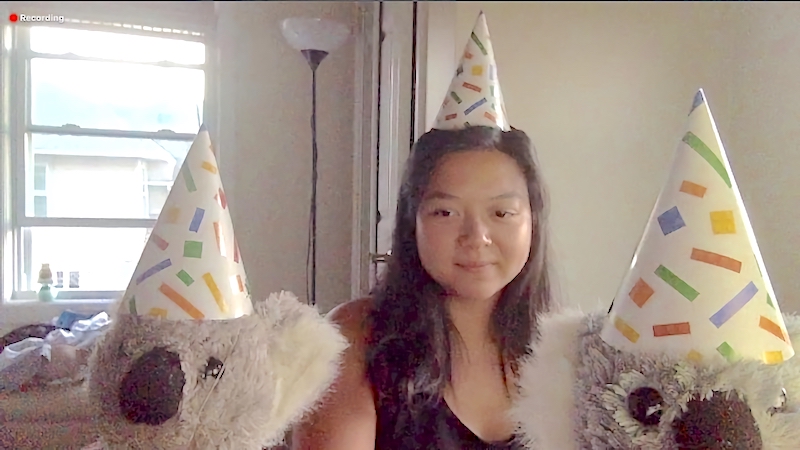
I truly do not even know how to begin to explain this, so please take it for what it is
. . . That I’d circle back to OT 405 and our shared love of “Hamilton: An American Musical” — a nod to the foundations of our friendship.
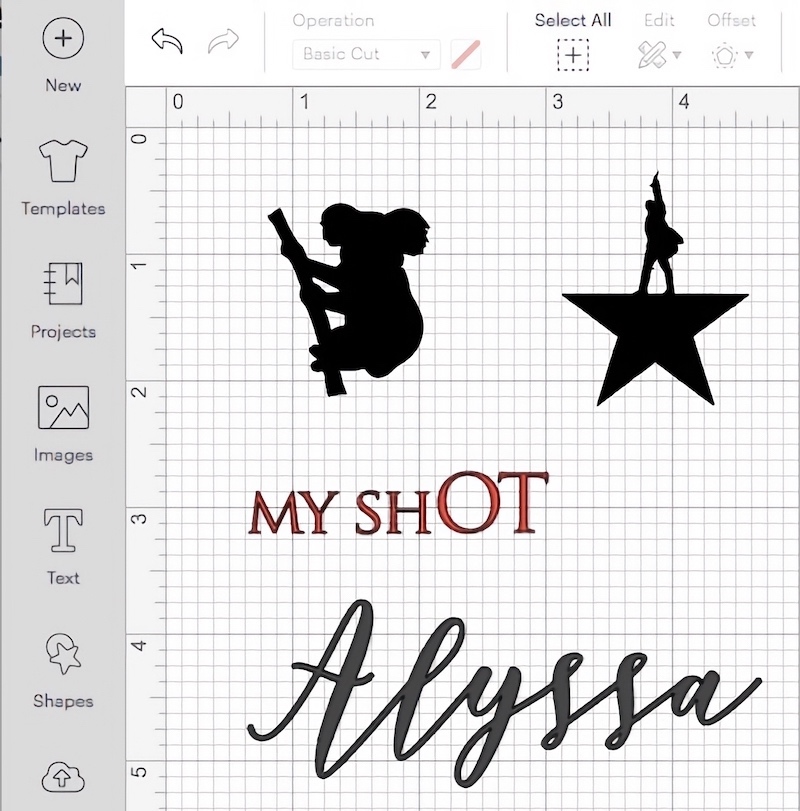
The designs I created on the Cricut Design Space app
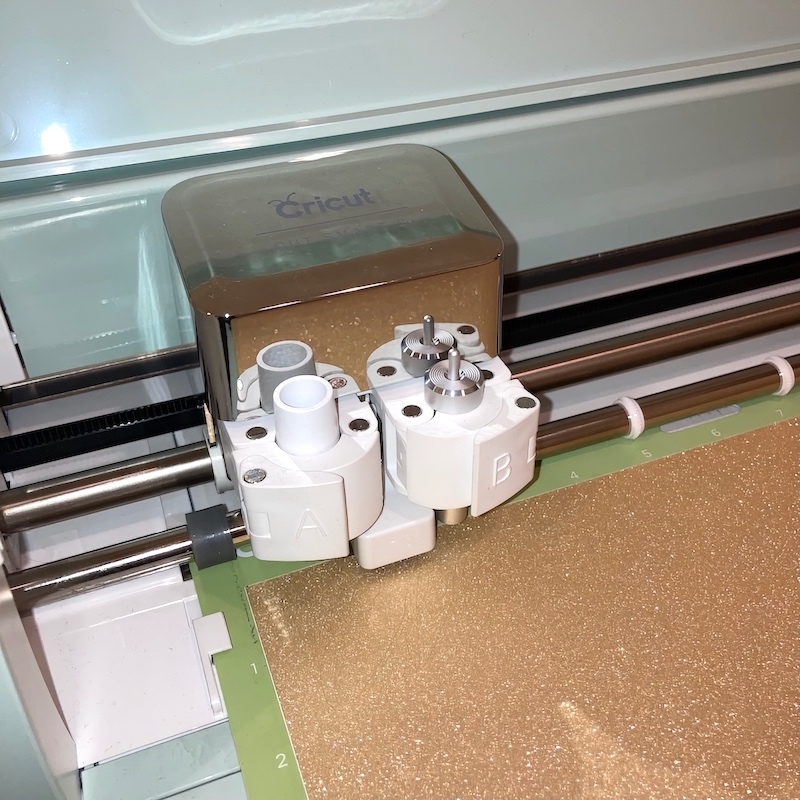
I selected the vinyl material I wanted to use, I arranged it to the cutting mat, I arranged it into the Cricut. (I arranged the menu, the venue, the seating!)
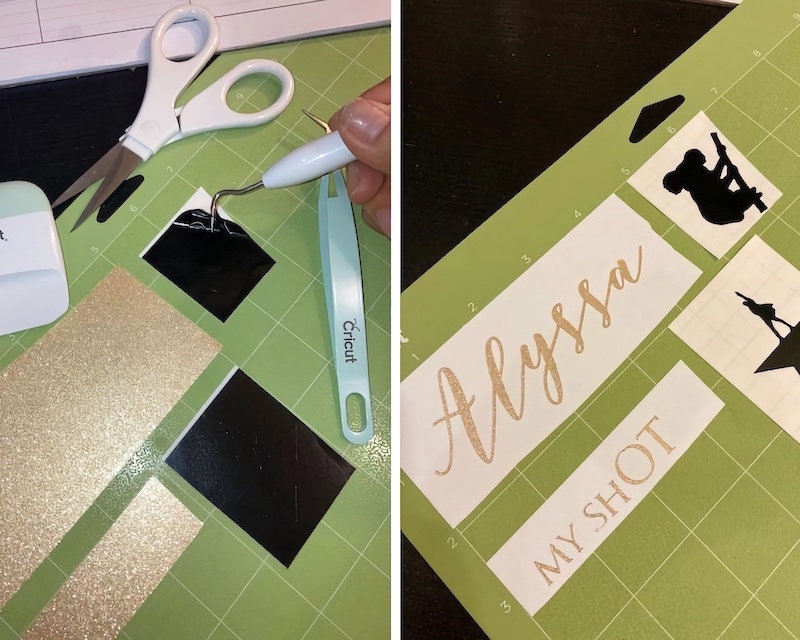
Left: This process is called “weeding,” where you extract the cut by removing the excess vinyl. Right: The finished vinyl cuts ready to be transferred onto the surface I choose using transfer tape!
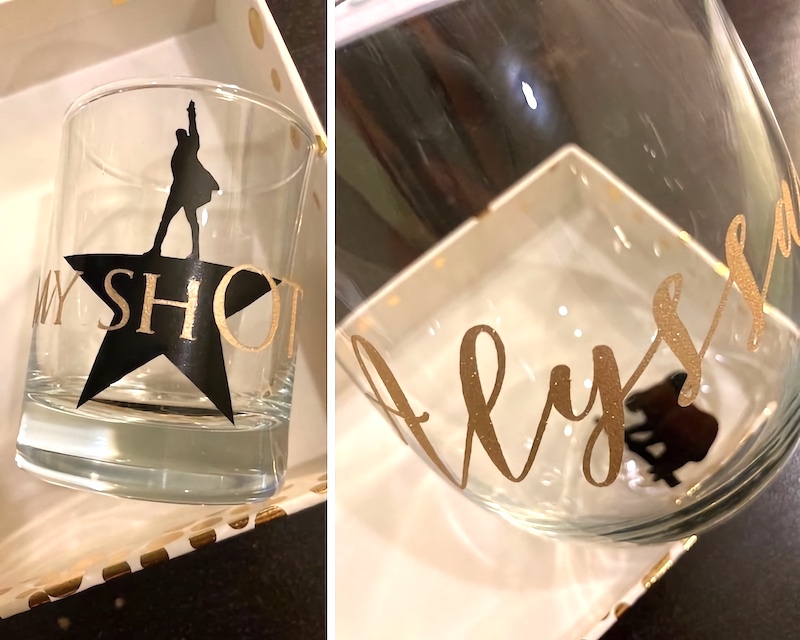
Left: Honestly, I’m pretty proud of this. Please, no one ever throw away their (sh)OT. Right: Lights are overrated, there should be a koala at the end of every tunnel.
I made these gifts during a week that, truthfully, I did not have time for. In between assignments, exams, deadlines, and applications, I was feeling overwhelmed and to be completely honest, I couldn’t remember the last time I had done something unrelated to school. So instead, I took a break and powered up the old ‘Cut. Something I really enjoy about the therapeutic process of crafting is that not too long ago, you just had a concept you were brainstorming in your head and now it’s a tangible, real thing you brought to life. I’m not just talking about physical items you create with your hands, either. You can “craft” anything — an essay you wrote last week that you’re really proud of, a flyer you made online to promote an event, a photo you captured to add to your carefully curated Instagram post, a blog you’re writing about what everyone initially thought was your love for insects. You took an abstract idea and introduced it into the world and if your mind can do that, think of all the things you’re going to do in the future. What a wonderful gift for this world to look forward to — the promise and hope of the products of your creativity and ingenuity that are yet to come.
There is also something beautiful to be said about an item you make with your hands. I spent hours on this gift, but each moment was such a mindful experience. How could you not say crafting falls under OT? From the fine motor skills it takes to handle tools and delicate material, to the executive functioning required to sequence tasks, to the visuoperceptive skills needed to locate and work with everything, to the social connectedness you feel in making the activity personalized . . . the list goes on and on. And then being able to give the end product to another person and in doing so, indirectly saying, “I made this for you because I care about you. But in making it, I was able to sit down and take time away from my stress, so even though I care about you . . . I care about me, too.”
Is there any gift greater than that?
I have the honor to be . . .
Your obedient servant,
T dot Pham
References
Reilly, M. (1963). The Eleanor Clarke Slagle: Occupational Therapy Can Be One of the Great Ideas of 20th Century Medicine. Canadian Journal of Occupational Therapy, 30(1), 5–19. https://doi.org/10.1177/000841746303000102
Slagle, E. C. (1930). Address to graduates. Occupational Therapy and Rehabilitation, 9, 271–276.
⋯
A Turning Point of My Life: From PKUHSC to USC ⟩
October 22, 2021, by Global Initiatives Team
Classes Fieldwork International What are OS/OT?
By Chen Gong, OTD
Editors Michelle Plevack and Abraham Ramirez
Entry-Level Professional Master’s students
What made you interested in occupational therapy?
My story with occupational therapy began in 2018 when I was an intern therapist in the Department of Rehabilitation Medicine at The Sixth Affiliated Hospital of Sun Yat-sen University in Guangzhou. As a beginner in OT, I attached importance to function-oriented treatment. However, my instructor encouraged me that I should pay more attention to the patient’s real life. Once, on a whim, I used a guitar to engage a patient with dementia in a music activity. The patient was relieved from the tiredness and boredom of previous therapy sessions. I could see tears in her eyes that this activity was meaningful to her. This incident has completely changed my opinion about OT, and let me really understand the meaning of occupation. Later, because of my love for OT, I came to the dual-degree OT program between Peking University Health Science Center (PKUHSC) and USC to continue my studies as an OTD student.
Why did you choose to continue your education with the OTD?
During my two years at PKUHSC, I gained a more systematic understanding of OT theoretical knowledge and gradually found the current situation of OT promotion in China. In many general hospitals, OTs have not found their own optimal practice area. OTs are unable to establish their professional identity and carry out meaningful acts of therapy. I deeply feel the inadequacy of my own ability. I look forward to further improving my professional level and leadership, exploring the OT market, and leading the development of OT in China in the future. I believe that studying at USC Chan will help me to achieve my goals.
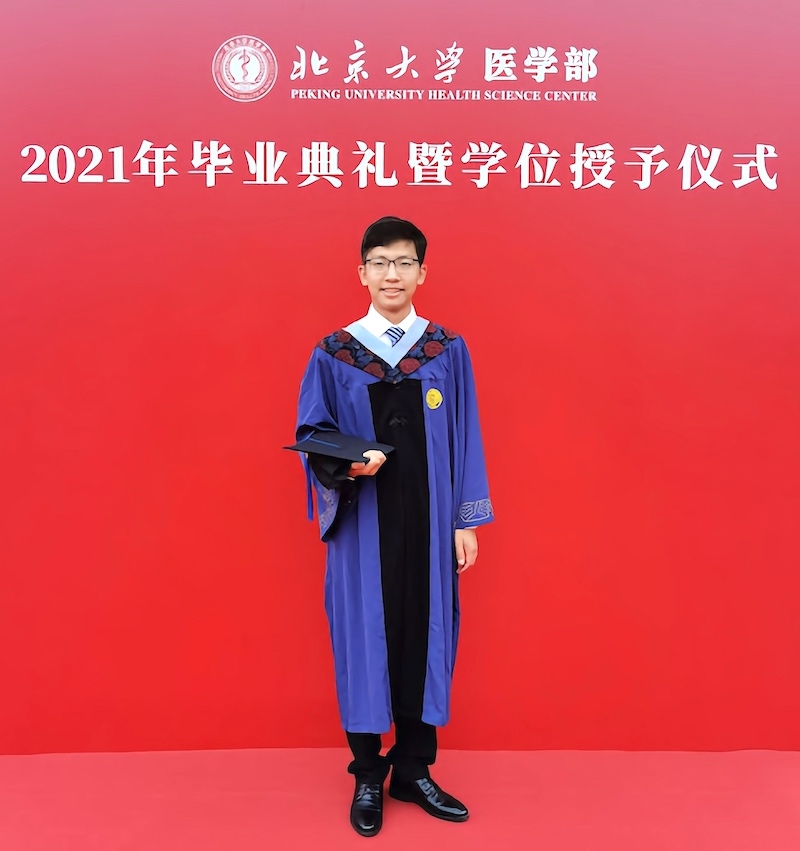
Master’s degree ceremony: Peking University, Beijing, China, Summer 2021
How has the transition from MSc in PKUHSC to OTD been?
China and the United States have very different cultural backgrounds. This ranges from the perspective of OT education, the way of communication between people, the atmosphere of class and work, and the pace of life here are all different from before. It has basically been like learning how to grow up and live again. Fortunately, I quickly adapted to the lifestyle and study context here. For the first semester, I am working with Dr. Emily Sopkin and Dr. Shawn Roll separately for pedagogy and research. Now I can actively act as a mentee.
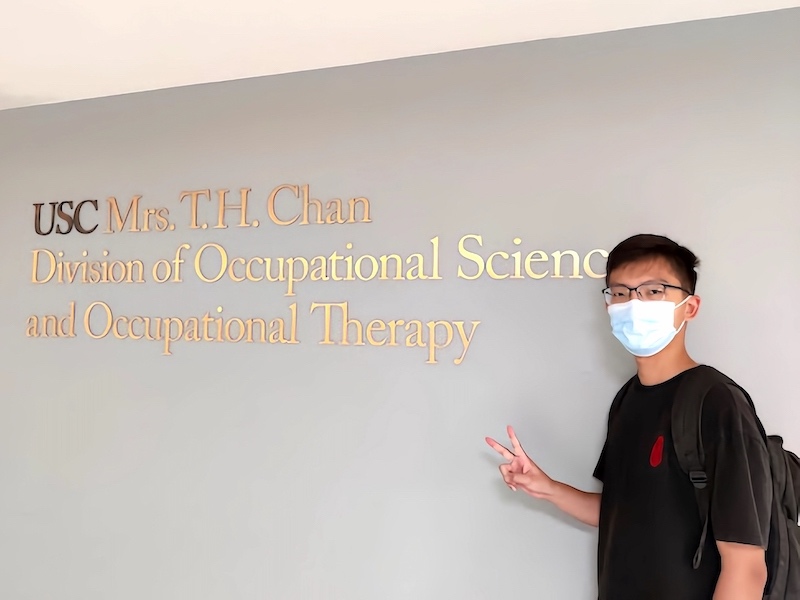
Chen’s First photo with USC Chan Division, Fall 2021
Describe your experience of OT school at PKUHSC vs USC.
Studying OT in PKUHSC for two years was really a very good experience. We completed the Master’s courses required by USC, and the way of teaching at PKUHSC was similar to USC Chan’s classes. In addition to the courses, we all completed a certain research project and published a paper in Chinese core journals. Through this, I have special appreciation for my mentor, Professor Ninghua Wang and her support for my research work. I also really appreciate my instructors Dr. Jane Liu, Dr. Liguo Qian, Dr. Hui Wang, Dr. Lily Xu and Dr. Buwen Yao, who were all students of USC Chan, and their efforts to localize these OT courses. Studying OT at USC is exciting. I can feel leadership everywhere. This immersion allowed me to think about how to develop my leadership. The Chan Division has its own unique experience in pedagogy, research, and clinical practice. I am sure I can learn something different from what I learned in PKUHSC, especially in clinical practice.
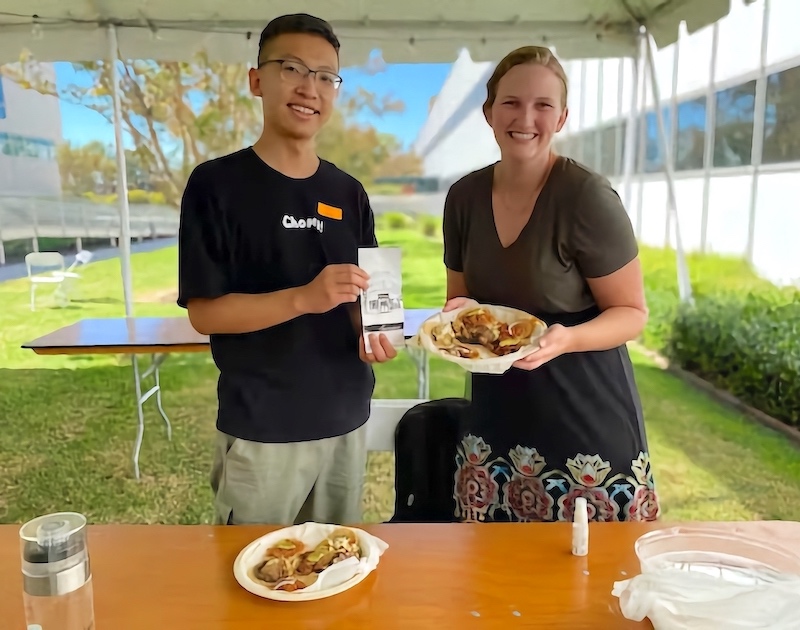
Unforgettable lunch with Dr. Emily Sopkin, Fall 2021
What do you think about your OTD residency so far?
It’s great! My residency for the first semester is mainly about pedagogy and research.
For my pedagogy residency I am a teaching assistant for OT 440: Kinesiology, which was also my favorite class when I was a Master’s student at PKUHSC. I enjoy this job. I developed a good mentoring relationship with Dr. Sopkin. I try to be creative by sharing knowledge related to the course with my students to help them learn from different perspectives.
For research, I’m working in the Musculoskeletal Sonography and Occupational Performance (MSOP) laboratory. Now I am gradually getting involved in existing research in the lab, which makes me feel fulfilled. As Dr. Roll said, “I don’t think it’s that important for you to learn a particular skill. It’s more important to immerse yourself in the research environment and see how research works.” I couldn’t agree more.
What kind of OT do you want to be in the future? Your plans/goals after OTD graduation? Or how will you promote OT services in China?
Actually, I want to be an active OT, who is purposeful, has great leadership skills and knows how to promote OT effectively. I also hope that I will be good at several clinical skills, which will help me establish my professional identity.
I plan to work in the OT department of a general hospital, mainly engaged in the occupational therapy of musculoskeletal and neurological disorders of the upper limbs and hands, and also undertake part of the teaching work, e.g. combining what I learned here with China’s clinical context and then trying to establish a practical framework of occupation-based hand therapy education. As for research, I will try to design and lead research projects and apply for national funding.
⋯






